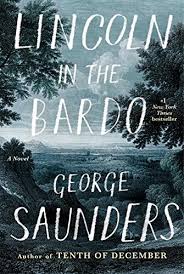Once again this year, I have set myself the goal of reading the Man Booker shortlist. The shortlist of six was announced on 13 September and the winner will be named on 17 October. The title and description of this book did not appeal immediately and it would probably not have been the book I started with, but the others took a few days to arrive and this was the one that was available in the library, so by default it became my starting point.

George Saunders is a well-established American writer, winner of the Folio Prize in 2014 (for Tenth of December, a collection of short stories) and on the back of my copy of this book are some impressive quotes from literary heavyweights: “A writer of arresting brilliance and originality” Tobias Wolff, “A morally passionate, serious writer…He will be read long after these times have passed.” Zadie Smith. High praise indeed. But this book? I just don’t get it.
The premise of the book is the untimely death of Willie Lincoln, eleven year old son of US President Abraham Lincoln in February 1862, whilst the American Civil War is raging. The Bardo is, according to Tibetan tradition, a kind of interim state that the dead enter prior to their admission to the final place where they will spend the afterlife. The Bardo, as imagined in this book, is a riotous place where the spirits, from different ages and social strata, mingle and squabble. Specifically, here, they argue over Willie’s soul and are fascinated by the vigil that Abraham Lincoln undertakes beside his son’s coffin. The cemetery (or perhaps more accurately the Bardo) is populated by a cast of characters who could easily have stepped out of a Victorian travelling circus; a mixture of grotesques and rogues, troubled souls and tragic misfits. Some are more fully realised than others; Hans Vollman. Roger Bevins iii and the Reverend Everly Thomas are our primary narrators, whose background stories are revealed in some detail, but many others make only brief appearances and are more like caricatures.
The structure of the book is very unusual, like nothing I’ve ever read before. There is no coherent narrative, as such, the story is told from the multiple perspectives. These not only include the restless spirits, but for the events that precede Willie’s death, or outside the cemetery, they are told in short paragraphs by third party observers, reporters and historians. What was most interesting to me, was how different some of these accounts were, despite the writers all seeming to have been present at the event described.
This book has left me feeling like I’m missing something. I know that it has been highly praised, but I’m afraid I just am not seeing anything particularly innovative here. To me it’s all just a muddle, with no story, where nothing really happens. There is one central theme, which seems to be that the dead do not rest easily until the living let them go, allow them to realise their ‘deadness’, but I’m not sure that single point is worthy of a whole book. And I didn’t really find the cast of spirits very entertaining or enlightening. I’ve read many books which have challenged form, which have taken some re-reading to fully appreciate. But for me, this book offers nothing that I want to delve back into. If it wins the ManBooker, I may need to go back to Literature School!
I dislike being critical. Did you find something of value in this book? What is it I’m missing?!
If you have enjoyed this post, please follow my blog and let’s connect on social media.

I made the mistake of starting with the long list and of course none of the books I read made it to the short list -typical! But that means I haven’t yet read the Saunders. However, from what you say I clearly should because my research work is into narrative structure, albeit I tend to look at texts that are rather more simply structured than this appears to be. I’m wondering just how much the fact that he is a short story writer is influencing his choices. Perhaps I should start with ‘Tenth of December’ and work my way through.
LikeLiked by 1 person
I’m not a big reader of short stories but my feeling is that this would actually work well as a play. It just felt very disjointed to me but I think a good stage design and production could enhance its strengths and diminish the weaknesses. A friend of mine said the audio version is very good.
A couple I’d read on the long list didn’t make it either – so annoying!
LikeLike